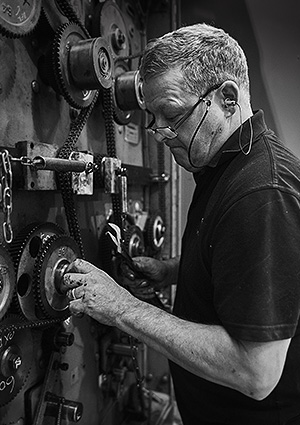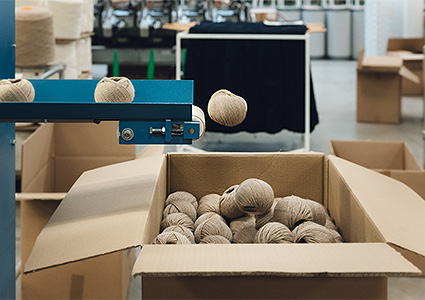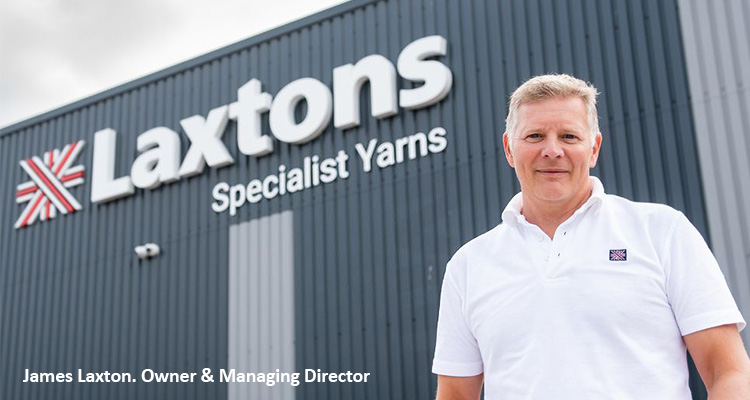Laxtons’ remarkable journey of resilience and reinvention
Laxtons, a cornerstone of the UK’s textile industry, is a name synonymous with craftsmanship, innovation, and endurance. Established in 1907, the company has weathered seismic shifts in global trade, two world wars, and the Great Depression, emerging not only as a survivor but as a beacon of British manufacturing excellence. From its heyday in the 1970s, when over 600 employees spun yarns of distinction, to its reinvention in the 21st century, Laxtons has proven that resilience and reinvention are woven into its very fabric.
James Laxton, fourth-generation leader and Managing Director, picks up the thread of this remarkable story. “My great-grandfather, George Laxton, founded Laxtons as a spinning factory in 1907,” James begins. “It flourished for decades, but by the 1990s, the tides turned. UK retail giants began outsourcing garment production to Eastern Europe and beyond, devastating domestic supply chains. By 2002, we faced a grim reality: closing our manufacturing plant.” 
Yet, where others saw an ending, James saw the seed of a new beginning. “That same year, I started Laxtons Ltd with a team of two and a 400-square-foot office in Ilkley. We had no customers, no products, and no production processes – just a century’s worth of expertise under our belt. We shifted our focus, sourcing yarn from Europe and spent years redesigning products and building an international customer base.”
As the business gained momentum, so did the challenges. Dependence on overseas manufacturers proved a gamble too risky to sustain. “It wasn’t unusual for me to hop on a plane at a moment’s notice to relocate raw materials due to factory closures,” James recalls. “I realized that for us to deliver the reliability our customers deserved, we needed to bring manufacturing back home.”
In 2009, at the height of the global recession, James made a bold move. While many companies were fleeing UK manufacturing, Laxtons was bringing it back. “People thought I was mad. But I believed we could offer something overseas competitors couldn’t: exceptional customer service and unparalleled quality.”
By 2010, Laxtons had achieved what few thought possible – a new spinning mill on UK soil, the first of its kind in over a generation. “It wasn’t easy,” James admits. “Commercial property was hard to find, and power availability was a constant issue. But we persevered, renting a site from a former customer and gradually expanding operations. That same year, we joined the inaugural meeting of the UK’s Campaign for Wool, headed by then Prince Charles, which aligned perfectly with our vision.”
As production soared, Laxtons took another leap forward. In 2017, the company moved into a purpose-built factory, a state-of-the-art facility designed to propel it into the future. “At one point, we were juggling construction, machine installations, and production simultaneously. It was chaotic, but transitioning to a new facility was a defining moment for us,” James says.
 Today, Laxtons is thriving, blending traditional expertise with modern innovation. “Our secret? Adaptability,” James shares. “We focus on bespoke, small-batch production and embrace change. For instance, lifecycle studies show that while our yarns may cost more upfront, they save money over the production cycle due to higher weaving efficiencies and fewer defects. Quality pays dividends.”
Today, Laxtons is thriving, blending traditional expertise with modern innovation. “Our secret? Adaptability,” James shares. “We focus on bespoke, small-batch production and embrace change. For instance, lifecycle studies show that while our yarns may cost more upfront, they save money over the production cycle due to higher weaving efficiencies and fewer defects. Quality pays dividends.”
Transparency and sustainability are also at the heart of Laxtons’ ethos. The launch of the Wooltrace range – a fully traceable hand-knitting yarn – marks a new chapter. “It’s taken over a year to navigate the complexities of sourcing wool traceable to individual farms, but we’re proud to offer a product that connects customers directly to the land it came from,” James reveals.
As Laxtons looks to the future, its transition to employee ownership underscores its commitment to legacy and people. “Succession planning has been on my mind for years,” James reflects. “The employee ownership model ensures Laxtons stays true to its roots while sharing success with the team that makes it all possible.”
Training programs are already underway to prepare the next generation of leaders. “My goal is to establish a board of directors that can run the business seamlessly, with minimal input from me. I want Laxtons to thrive long after I step back, and this model ensures our legacy endures.”
Resilience, reinvention, and a steadfast commitment to quality: Laxtons isn’t just spinning yarn – it’s weaving the future of British manufacturing.
